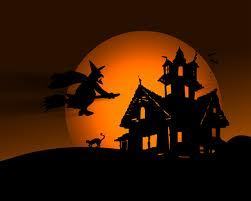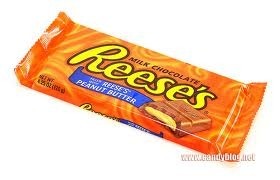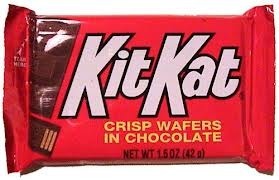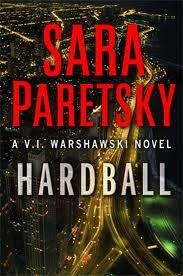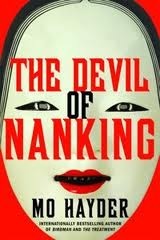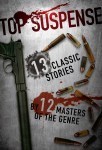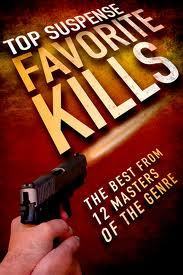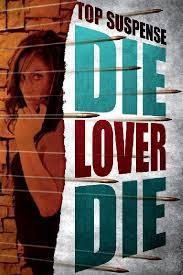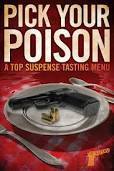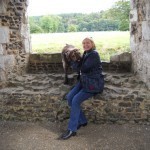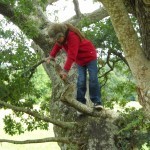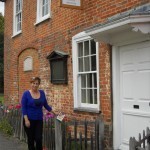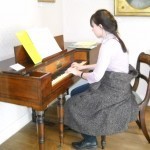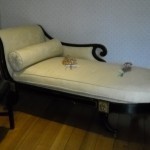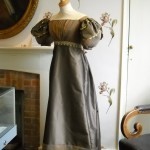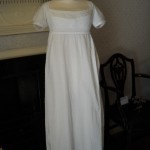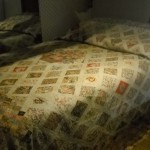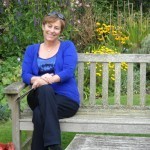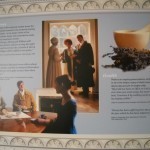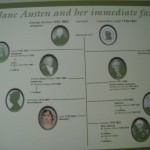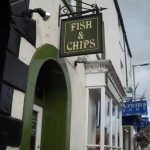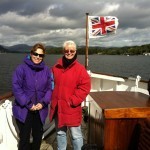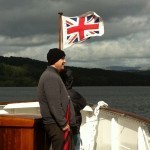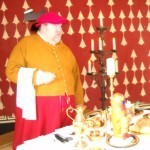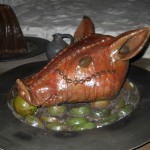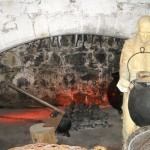Libby Fischer Hellmann's Blog, page 55
October 25, 2012
The Scariest Thing That Ever Happened To Me
 Since the season is upon us, I’d like to tell you about the scariest thing that ever happened to me. Actually, I have several experiences from which to draw:
Since the season is upon us, I’d like to tell you about the scariest thing that ever happened to me. Actually, I have several experiences from which to draw:
– I was caught in a fire in my apartment building and had to run down a smoke-filled staircase
– I was mugged in downtown Chicago with my daughter at Maggiano’s (although the fear didn’t start until after it was over)
– I was in —um—an altered state in rural New Hampshire— and thought I was about to be locked in a closet that was part of the Underground Railway for slaves
When I’m asked that question as an author, I usually say the scariest thing I can imagine is being stalked by someone who wants to kill you, but you don’t know who they are or why they’re after you… which happens to be the premise of SET THE NIGHT ON FIRE. (Just sayin’)
But the scariest thing in my life happened over forty years ago in Washington, DC. Yeah, I know. The entire city is probably the scariest place on earth these days, but…
I had just gotten my drivers’ license and was driving my mother’s car. She had a blue ’65 Mustang convertible, btw, which, at the time, was one of the most awesome vehicles around. And looked a lot like this: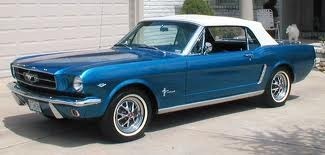
So, of course, I borrowed it as much as possible. It was October or November, and I was trying to get to a friend’s house in Rockville. It was after nine PM, dark, and I had been cruising around the Beltway. Now, you’ve got to remember this was just after the Beltway opened, and they were still working on some of the entrances and exits. Drivers too (well, okay, me) were still getting familiar with the road. Also remember, this was pre cell phones, texts, and GPS.
I’d only been on the Beltway once or twice before, but with a typical teenager’s arrogance, I was sure I knew where to go. Turned out I didn’t. Somehow I went in the wrong direction. I kept waiting for a sign for Bethesda or Rockville. Instead I started seeing signs for Virginia. After about ten miles I realized I was going the wrong way and decided to get off at the next exit, turn around, and backtrack.
However, I didn’t pay attention to the sign when I turned off. Suddenly I was on an empty road. It was well paved, but there were no other cars on the road besides me. In addition, there were no lights, no houses, no stores or shops, not even any farms. It was just a dark road with no signage. Worst of all, there were no exits OFF the road. It was like being on a road to nowhere. And it looked a lot like this: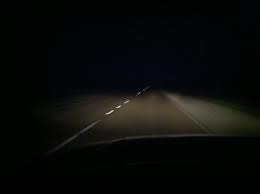
I kept going for another ten miles or so. Still no exits. No intersecting roads or highways. No lights. No one on the road but me. No signage. The only way to go was forward. By now it was about ten PM, and I started to shiver. Where the hell was I? Where was I going? I sped up to about 80 mph, thinking that would do something.
It didn’t.
I kept driving. By now, I was terrrifed. I decided I must have landed in the Twilight Zone, and that I was never going to get out. I sped up to ninety. I was lost, and I was panicked. In fact, that was probably my first panic attack. At that time of night, at that season, on that road, it was not impossible to imagine some monster, some evil villain out of a James Bond movie, or some malevolent alien was after me. Tears streamed down my face as I tried to find a car, a house, some symbol or artifact of civilization.
Finally in the distance up ahead, I saw a pair of red taillights. I raced toward them, (thank god for the Mustang) and honked frantically. The guy driving the car looked at me as though I was the monster, but eventually, he must have seen my terror and pulled over.
“Where am I?” I cried.”I turned off the Beltway and I have no idea where I am.”
He looked at me, raised his eyebrows, and said, “You’re on the road to Dulles Airport.”
Now, what you need to know is that along with the Beltway, Dulles airport had just opened, and the Beltway engineers had built a special access road to the airport. But at that time, there were no exits off it yet, and there was no development along the way. Just that two lane highway. And me. And my mother’s Mustang.
Needless to say, I thanked the man profusely, drove all the way to the airport, turned around, and came home. But I was fried, and forty years later, I still don’t like driving at night on unfamiliar roads.
P.S. Given that this is the spooky season, wanted you to know that ACX is having a special spooky audiobook sale, and AN EYE FOR MURDER is one of the featured audios. Hope you’ll check it out. You can find all the featured audios over at Audible right here.
And Happy Reese Bars and Mounds Bars and Kit Kats to you!
October 15, 2012
My 6 Favorite Female Crime Writers
Before all the “Best of 2012” lists start coming out, I thought I’d weigh in with one of my own. It’s not a 2012 list, nor is it an exhaustive analysis. It’s simply the 6 female authors I will enthusiastically read—whatever and whenever they publish. It’s not a static list, either; some of the writers just appeared, while others have been on it for years.
Which brings me to one of my theories about the book industry. I’m beginning to think an author gets 10 years in this business. If, in that time, their protagonist hasn’t changed, developed, or grown (something others call a “dynamic protagonist”), or if they haven’t reinvented themselves with a new series or sub-genre, their readership will wane. I see it happening over and over. Authors who used to be “must-reads” aren’t any more.
Part of it is due to the broadening of the industry through indie publishing, but I think most of it is due to authors writing too much of the same for too long. Given that I’m coming up on a decade myself—my first novel was published 10 years ago—I’m sensitive to that.
But I digress. Following are my favorite 6. I think they’ve safely crossed the 10 year threshold or soon will. (Btw, I’ll be writing about my favorite male authors next time). They’re the kind of writers that make me drop everything else that’s going on just so I can finish their novels.
Sara Paretsky is the only author who’s been on my list since I started reading crime fiction. I read her V.I. Warshawski books as well as her stand-alones because I know I’ll always get a good read, a terrific story, as well as something to chew on. Yes, Sara wears her heart on her sleeve, but that appeals to me. I always know where she’s coming from, and she usually explores an issue that needs to be explored. Plus V.I. has changed over the years; she’s mellowed, she’s not as strident, and she even has developed a sense of humor. She’s also aware of her own limitations in a way that she wasn’t when the series started. But that doesn’t keep her from railing against injustice, whatever its guise. If you haven’t read her recently, I highly recommend HARD BALL.
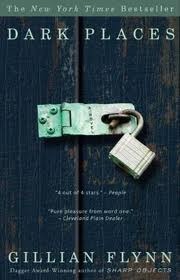
Gillian Flynn delivers the most lyrical, gorgeous prose of anyone in the crime genre these days, and the paradox between the beauty of her prose and the evil of her subject matter takes my breath away. I know everyone is talking about GONE GIRL right now, but you should start with SHARP OBJECTS and then DARK PLACES. It’s in these crime novels that you will find a Machiavellian spirit laced with a splashof Pollyanna: dark, but a hint of light at the end of the tunnel.
Mo Hayder jumped onto the list after I read THE DEVIL OF NANKING, and I am slowly making my way through her other novels. Like Gillian Flynn, Mo Hayder’s prose is precise and lyrical, and the crimes she details are often horrid… sometimes almost unbearable. But I admire her courage. And her ability to write a believable, persuasive police procedural series featuring a male character, JACK CAFFERY. And, of course, the way she writes women is fabulous. I always get lost in her stories and race through them, which makes me sad when I finish. I want more.
[image error]I first read Val McDermid’s PLACE OF EXECUTION and was entranced by her story-telling abilities as well as her straightforward depiction of crime and evil. I have not been disappointed. She’s another author who can write men as well as women (have you noticed the best female authors tend to write men better than male authors write women?), but when she’s writing female characters, her books really take off. Carol Jordan could be a doppelganger for every woman who is afraid to reveal her shortcomings and yet defiantly remains female. Not that I dislike Tony Hill. On the contrary. I loved THE TORMENT OF OTHERS. And I love Kate Brannigan. Val is the kind of writer that sweeps me into her world from the first page, and I want to stay there forever.
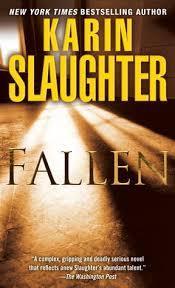
Karin Slaughter: I read her early novels, but she didn’t capture me until her Will Trent series. Will’s unique mix of genius and shame is appealing, and I fell in love with him right away. At the same time, Slaughter’s female protagonists deal with the duality of femininity and strength in an utterly plausible, fascinating way without resorting to stereotype. Even her side characters have their own back story (I’m thinking of Lena) which makes them memorable. I don’t understand those who say her writing is too graphic… but how can we really understand evil if we don’t see its manifestations in the physical world? I havent read her latest yet, but it’s on my TBR pile.
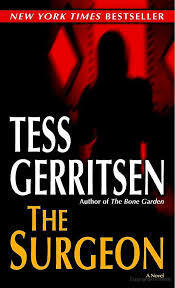
From THE SURGEON, I discovered that Tess Gerritsen writes pure unadulterated suspense, and I love having to keep turning the pages to find out how her characters are going to get out alive. Like the others, Tess doesn’t shy away from detailing the dark side of human behavior. But, as I said above, how can we understand the nature of evil if we don’t see it in all its guises? Tess makes sure that we do. It may not be pretty, but the satisfaction of seeing Jane Rizzoli and/or Maura Isles prevail against it in each outing is seductive. At least to me. Happily, I’m behind on some of her books, so I have some great reading to look forward to.
OK. This is just my personal list — I know I’ve left out tons of excellent authors… but what do you think of these six?
October 8, 2012
A Book on Writing that Really Rocks!
As some of you know, I am part of a group of twelve excellent crime fiction authors. We call ourselves Top Suspense, and you can find us here, here, and here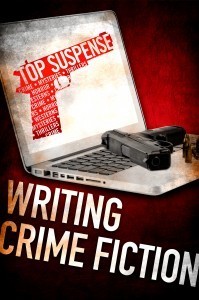 .) All of us have been published multiple times, have garnered hundreds of award nominations (some of us even won), and have been around the block for a while.
.) All of us have been published multiple times, have garnered hundreds of award nominations (some of us even won), and have been around the block for a while.
Since we’ve been together, we’ve published several anthologies and a killer round-robin short story called Die Lover Die (You have to read this). But our most recent publication is the one I love best, and I want to tell you about it. It’s probably a form of BSP… but worthwhile nonetheless.
WRITING CRIME FICTION came out of a group discussion on craft. Yes, authors don’t just talk about Amazon, KDP, rankings, and sock puppets—sometimes we actually talk about our writing and how to make it better. It was an easy transition from chatter to “Hey, Let’s Write A Book.” So we did.
It looked promising when almost everyone chose a different topic to write about. Okay…Lee Goldberg and Paul Levine’s topics were similar, but happily, their articles ended up quite different from each other.
But I knew the book was going to rock (I was privileged to be one of the editors) when the essays started coming in. Whether about going indie, going Hollywood, writing historicals, sex, or defining noir, each article was cogent, offered practical advice, and in many cases, was personally revealing and/or funny as hell.
Here are a few excerpts:
Joel Goldman on Going Indie: “I wanted to “go indie,” but I didn’t know anything about self-publishing except that Joe Konrath was making a crapload of money doing it. To get ready, I spent six months learning as much as I could… Since then, I’ve sold more than one hundred thousand copies of my backlist, recouped all of my start-up costs, and made enough money to fund my ongoing publishing and promoting without investing any additional money. I don’t say this to brag (well, maybe a little).”
Ed Gorman on Writing the First Novel: “Before this, the process of starting at point A and going through to point Z was mysterious, but when I saw it laid out on typing paper, it was no longer such a puzzle. It made practical sense to me now. I also remembered something Al had told me: Look at every chapter like a short story.”
Paul Levine on Hollywood: “I came to Hollywood for the health insurance. That’s right. I lusted after cheap meds, not fame and fortune, when I migrated from Miami to Hollywood thirteen years ago. And why not? A doctor’s visit costs ten bucks at the industry-subsidized Bob Hope Health Center. I quickly learned, however, that writers pay their dues in many other ways.”
Max Allan Collins on the historical PI: ”Back in the mid-seventies, I was rereading The Maltese Falcon for the umpteenth time when I noticed the copyright, causing me to muse, “1929 . . .year of the St. Valentine’s Day massacre—Al Capone and Sam Spade were contemporaries.” In the comics business (like Spillane and Hammett, I’m a veteran of that field), a lightbulb would’ve gone on over my head as it occurred to me that the private eye had been around long enough to exist in a historical context.”
Dave Zeltersman on Noir: “In noir, the hero is doomed, but his doom is of his own making. Noir isn’t about tragedy; it’s not the fates conspiring against some poor luckless soul. Instead it’s about our hero sealing his own fate by crossing a line that can’t be uncrossed.”
Vicki Hendricks on Sex: “Writing a sex scene is not as much fun as participating in one—you probably guessed. However, if it is possible for you to enjoy yourself while sitting at the computer hour after hour, tediously moving words around to find some phantom best arrangement, when you could be baking bread or painting the bathroom—or drinking beer—then writing a sex scene is your best bet.”
And that’s only six of the excerpts. I am very proud of our work in this collection. I hope you’ll give it – and our other work– a look.
October 1, 2012
Waverley Abbey with an “e”
My last trip in the UK was to the ruins of Waverley Abbey (I was told not to forget the ‘e’) in Surrey with Tania and her son Giorgio. King Henry VIII had the bad taste to destroy this abbey about 500 years ago. Prior to that, though, it was a bustling place for about 300 years. The strangest thing happened when we got there. We were with Tania’s dog, Leo, and her son, Giorgio, but when we got out of the car and started walking toward the ruins, we heard what I could only describe as a Gregorian chant. Now, I know the timing isn’t quite right… (Gregorian chants were popular before the Abbey was built), but it was an eerie melody. And we never figured out where it was coming from. Made the entire experience quite mysterious. Here are some photos from our visit, and then other photos where we celebrated Tania and Marco (her husband)’s 15th anniversary.
Cheers!
Celebratiing!
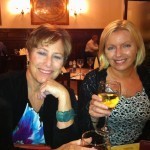
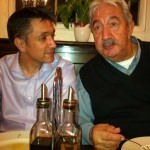 (Marco and his father, Sergio)
(Marco and his father, Sergio)
September 29, 2012
The House Where Jane Austen Lived
After the rustic, beautiful swaths of land in Cumbria and the Lake District, I took the train down to Euston Station in London, transfered over to Waterloo, and got off in Farnham in Surrey to stay with the talented and charming Tania Tirraoro.
Tania and I met on the internet about two years ago. Like me, she’s a publicity professional AND a writer, and we hit it off. We’ve corresponded and Skyped, but this was the first time we’d met. She has graciously blogged about it here. As for me, I was amazed and delighted that she welcomed me to her house and family for four days. The stay included a family dinner and a party for her 15th anniversary. It was all wonderful!
She also took time from her busy schedule (she was due to go to Sweden for a conference) to chauffer me around. The highlight was our trip to Jane Austen’s house in Chawton. Except for the garden, it’s not in great shape — the eaves sag and the floors squeak—so I hope renovations will be done soon. Still, it was fascinating. Here are some of my photos…
The exterior:
Two sides of the front room/parlor:
 The dining room. (Dont you love the model?):
The dining room. (Dont you love the model?):
Dresses she and her sister wore:
Jane’s bed (She shared it with her sister and it wasn’t even a double!):
Historical information and artifacts (Feel free to click and enlarge)
Finally, we couldn’t leave without a visit to the pub across the street…
September 27, 2012
Cumbria and the Lake District
Now for the most beautiful part of my trip. First Cumbria, in the Northern part of England and then Lake Windemere, in the Lake District.
Enjoy!
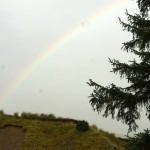 The first morning in Cumbria, a rainbow greets me…
The first morning in Cumbria, a rainbow greets me…
 Sheep, Sheep, and more sheep. Gave me a taste for lamb, which Zoe cooked to perfection!
Sheep, Sheep, and more sheep. Gave me a taste for lamb, which Zoe cooked to perfection!
 OK. There were horses too, but we didn’t eat them.
OK. There were horses too, but we didn’t eat them. 
 Stone walls built centuries ago without a speck of mortar. Amazing!
Stone walls built centuries ago without a speck of mortar. Amazing!
Now Lake Windemere:
And dinner at Miller Howe with author and screenwriter extraordinaire Stephen Gallagher!
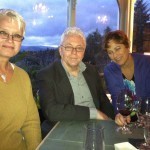
Going South tomorrow…
September 26, 2012
If It’s Wednesday, it must be Stirling
Well, really, it was last weekend, but who’s keeping score? On Saturday I drove from Edinburgh over to Stirling where my partner in crime, Author Zoe Sharp, and I spent the day (and night) carousing with writers mostly from Scotland. I met some folks with whom I’d been corresponding, and even more with whom I hadn’t. Funny, even though we’d all just met, I felt right at home. I guess all writers have the same issues.
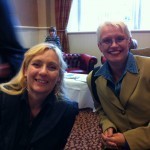 Caro Ramsay and Zoe Sharp in the Green Room
Caro Ramsay and Zoe Sharp in the Green Room
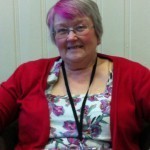 Pat McIntosh who writes historicals and urged me to go to Stirling Castle (Great suggestion, it turned out!) Check out her purple doo…
Pat McIntosh who writes historicals and urged me to go to Stirling Castle (Great suggestion, it turned out!) Check out her purple doo…
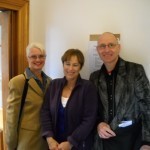 Zoe, me, and Nigel Bird, whom I’d been corresponding with.
Zoe, me, and Nigel Bird, whom I’d been corresponding with.
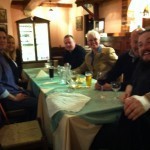 Dinner at an Italian restaurant in Stirling: Al Guthrie, Russell MacLean, Tony Black, Zoe, and more
Dinner at an Italian restaurant in Stirling: Al Guthrie, Russell MacLean, Tony Black, Zoe, and more
On Sunday I went to Stirling Castle and took the tour. It was marvelous. Everything you could ever want in a royal castle. And it’s all been renovated.

 Outside the Portcullis… (God… haven’t used that word since high school!)
Outside the Portcullis… (God… haven’t used that word since high school!)
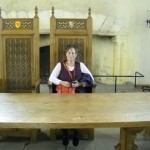 In the royal chapel. I’m sitting in the King’s chair, of course…
In the royal chapel. I’m sitting in the King’s chair, of course…
 The Unicorn… an important symbol for the Scottish Royal family.
The Unicorn… an important symbol for the Scottish Royal family.

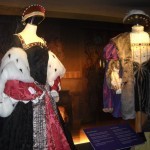 The gardens… and the wardrobe…
The gardens… and the wardrobe…
Tomorrow, on to Cumbria and the Lake District!
September 25, 2012
A Photo Diary of the UK: Edinburgh
As some of you know, I just returned from 10 days in the UK. It was a spur of the moment trip (well, as spur of the moment as you can be and still get a reasonable flight), but it turned out to be one of the most relaxed, fun trips I can ever remember, so I thought I’d share some of my photos in a chronological picture diary.
First up is Edinburgh, Scotland. (Btw, comments and captions are welcome!)
 Looking up the street towards Edinburgh Castle
Looking up the street towards Edinburgh Castle
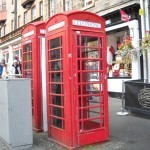 The Tardis has landed.
The Tardis has landed.
 The Castle.. one of two I visited…
The Castle.. one of two I visited… 
 The Big Gun
The Big Gun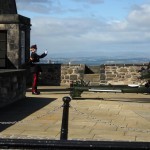
On High Street 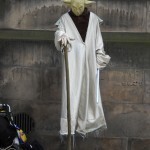
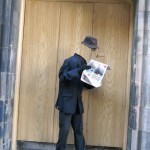
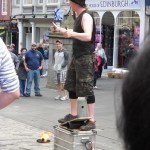
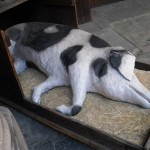 They do love their pigs…er… boars
They do love their pigs…er… boars
 Everyone needs a scone with clotted cream…
Everyone needs a scone with clotted cream… 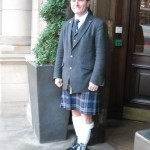 and a man in a kilt…
and a man in a kilt…
And a Yacht, especially if it belongs to the Royal Family and is named Brittania…
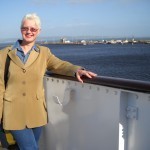 Zoe Sharp preparing to take the helm….
Zoe Sharp preparing to take the helm…. 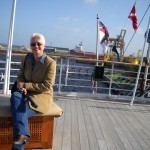 Or maybe not.
Or maybe not.
 Dinner for 45, James. At 7 o’clock sharp, please.
Dinner for 45, James. At 7 o’clock sharp, please.  But first we’ll have drinks in the salon.
But first we’ll have drinks in the salon.
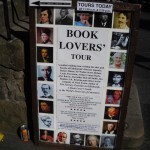
And looking ahead to the next part of my journey, the Scots do love a good read….
September 21, 2012
Audiobook Narrators: A Peek Behind The Curtain
As many of you know, thanks to the digital revolution I have now released all my novels as audiobooks. ACX.com deserves special mention, because it was through their exchange that I was able to audition and choose narrators who are consummate professionals.
And that’s the key. If you take this story-telling business seriously, you need to be professional, and that includes the audio versions of your books. It’s far more difficult than you think to voice your own book, and I don’t recommend it. If you want the best storytelling possible, you need a professional. Part artist, part technician, a good narrator is a magician. They can add a dimension of drama, emotion, and conflict you never thought possible. And give your work a polished sound. They did for me.
Given that, I’d like to introduce you to two of the best narrators I’ve heard. And what better way to meet them than to hear excerpts of their work?
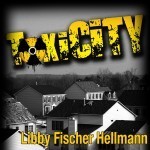 First up is Robin Rowan, reading the prologue from TOXICITY. (Click on the title then the green button beside the word “sample.”) I love Robin’s voice and the way she captures the text and makes it come alive. She’s absolutely perfect for Georgia Davis and my darker stories.
First up is Robin Rowan, reading the prologue from TOXICITY. (Click on the title then the green button beside the word “sample.”) I love Robin’s voice and the way she captures the text and makes it come alive. She’s absolutely perfect for Georgia Davis and my darker stories.
Next Mary Conway, whose crystal clear voice is melodious and charming, reads from A SHOT TO DIE FOR. She’s perfect for the Ellie books, and the one cozy novella I recorded.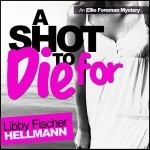
And now here they are, in the flesh, so to speak.
1. Why did you decide to become an audio book narrator?
ROBIN: I have always loved the storytelling aspect of audio books, and truth be told, have been trying to break into the field for about 20 years.My break came in 2009, with a series of mysteries by best-selling author Elizabeth Lowell. Oh, and I majored in storytelling at the University of Wisconsin (it was the Seventies!). Actually I was a speech major with an emphasis in the oral interpretation of literature– aka, storytelling.
MARY: I have been a working actor for most of my life but when I became a Mother, life on stage (and on the road) no longer fit my lifestyle. As a narrator, I love that am able to use my acting skills and keep a flexible work schedule that allows me to spend time with my family.
2. What skills does a narrator need?
ROBIN: Your listeners must believe what you are telling them, so a very fluent, conversational style, no matter if you are reading a novel, a biography, or a do-it-yourself book is critical. You’ve also got to have s-t-a-m-i-n-a. Try reading out loud for an hour. How does your voice sound? Is your throat scratchy? Yeah. Audio book narrators swear by many different remedies to keep them going—“throat coat” tea with honey and lemon, Binaca drops, Blistex lip balm, green apples, there are as many ideas as narrators! Can you listen to your voice for 10 hours? Think about someone else listening to that voice. Also, narrators have to totally immerse themselves in the story. I remember a beautiful moment when I recording “An Image of Death” for Libby—it was getting SO intense and I just kept going and suddenly realized I’d been reading for 6 hours without a break—very unusual, but such a GOOD story!
MARY: It’s a lot more than just having a good voice, that’s for sure. You also need to be a good story teller and interpret the author’s tone and intention. Different types of books require a different style “read”. For fiction, you need to master accents and different character voices. In fact, I often do research into the places where stories take place, the regional dialects and cultural differences. It’s really a lot like preparing for a role on the stage, only you get to play every single part! You need technical chops as well. In the last few years the industry has embraced the independent narrator as producer, which has empowered us to find a lot more work, but also creates pressure to learn audio engineering.
3. What equipment do you use, and how did you learn how to edit?
ROBIN: My studio is the 8 x 4 walk-in closet of my home, complete with lots of clothes on the wall that faces the street—a perfect sound barrier. I have several 2’ x 4’ sound barrier panels on the other walls and the ceiling, thick carpeting, and a louvered door for a little bit of air (there is no vent in there—too noisy!). I use Adobe Audition CS5.5 recording software along with a beautiful Symetrix 528E voice processor, a tiny mixing board I bought at the Guitar Center, and a wonderful Electro-Voice RE27 ND microphone, which “floats” on a microphone boom that is permanently affixed to the table. I still use a big desktop computer, while many others have now gone the laptop route. Having the big computer feels more like a “studio” to me.
When I started out in radio in the Seventies, editing consisted of splicing reel-to-reel tape with a razor blade and taping it back together. We have come a long way. Learning how to edit is on-the-job training. Unless you’re a New York or L.A. union talent with a separate director, separate editor, and a client listening in to your session (meaning you touch nothing, not even the microphone!), you’re a one-person company, so you have to learn how to do. everything. The hardest part isn’t highlighting and then deleting your obvious mistakes, but actually listening to yourself talk with a very critical ear. I ask myself, “Can I do it better?” I always say “yes,” and if time would permit, I’d give everything a second, third or even fourth take.
MARY: Two words-”baby steps.” I started out with a $99 USB Snowball Microphone and free Audacity software and worked my way up the learning curve, adding better equipment a little bit at a time. Now I have a shiny new Macbook, with a much fancier microphone and I can proudly cruise my way around Pro Tools. I am constantly upgrading my recording space as well.
Editing is really two skill sets. There is the computer part where you have to learn the software technique and all the shortcuts, and I am still learning. It can takes years to discover all there is to learn in ProTools. But to be a good editor you also need to have an “ear” for it and a natural instinct for timing, which is something I have always been pretty good at and is probably why I became an actor.
4. What are your favorite genres to read/record? Why?
Of the books I’ve done so far, mysteries are my favorites, since there’s always something to move the plot along and usually a big surprise or plot twist at the end. That said, I’ve just delved into a series of 5 fantasy books which I’ve never tried before, and am having a blast. I love doing characters; I consider that a great challenge. For the four Elizabeth Lowell books, I read British, Chinese, Southern American, Australian, Russian and Lithuanian characters. I can do British and am okay with Southern, but Chinese? It was hard, but I’ve learned to find not only someone on YouTube speaking English with a Chinese (or whatever) accent, but to find someone doing an impersonation of someone with a Chinese accent. It is exaggerated, and so easier to pick out how the words are accented.
MARY: Definitely fiction, and I prefer contemporary stories, mysteries, thrillers, and “chick lit”. On my own time I love classic and historical novels, but for narrating I do best with things that suit my voice and my personality, which tends to be colorful and outgoing. I enjoy humorous and witty characters with a touch of sarcasm, and I love to read snappy fast paced dialogue. I enjoy some non-fiction as it affords me the opportunity to learn about new things. Reading really does make you smart, which is something I am always barking at my kids. But it’s true! So I hope they are reading this…
5. You have 30 seconds to tell the world why they should listen to audiobooks.
ROBIN: Some you’ll love, and some you won’t be able to get through. You have to connect with the narrator, and the narrator with you. If they can’t draw you in during the first 5 minutes, you probably won’t enjoy the book. Find a good storyteller, and you’ll be hooked for life!
MARY: We live in a crazy, fast-paced, hyper-busy society and Audiobooks give us the gift of multi-tasking! My friends are always complaining that they don’t have time to sit down and read a book. With audiobooks you can listen in the car, on the train, at the gym, while doing dishes, or folding laundry.
Thanks, ladies, for allowing us to peek behind the curtain. You are both terrifically professional. And readers, to find out more about Robin Rowan click here. Mary Conway can be found here.
What do you like about audiobooks?
September 4, 2012
An Open Letter To Amazon
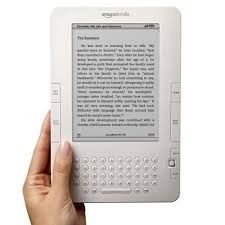 Dear Amazon,
Dear Amazon,
I know you’ve been paying close attention to the most recent flare-up about sock puppets and fake reviews. I know you feel badly about it, even though some people don’t think so. And I know you’d like to come up with some kind of solution. I don’t know what that solution is, but I think it’s time for you to step in.
The real issue isn’t fake reviews. It’s an author giving his or her competitor a one-star review on your website. As you know, when an author gets a one star review for a title, it brings down the average ranking for that title. That, in turn, makes the book less visible on Amazon, thanks to your algorithms which make possible the “also-boughts” and “recommendations.” That, in turn, affects sales of that title. So when a title’s ranking dips, there are very real economic consequences. For you (you’re not getting the sale)… as well as the author (who has been unfairly castigated).
If that castigation is the result of another author’s behavior, that (at least to me) is theft, and I wish you would treat it as such. Because, in the final analysis, author manifestos aside, you are the only ones who can control it. I’ve seen some suggestions about tracking ISPs, and other suggestions that I’m too computer illiterate to understand. But you do. You have the technical ability and the moral responsibility to make this practice go away.
My dear Amazon, it really is in your economic self-interest to act. The main value of your website (and I say this as someone who has benefitted greatly from your practices and hopes to continue doing so) is the availability of consumer reviews which are used by your customers to make a purchasing decision. As a friend said, and I’m paraphrasing here, if those reviews are no longer of value, why shouldn’t a customer go someplace else to do their shopping?
I don’t want to see that happen, and I know you don’t either.
Sincerely,
Libby Hellmann


